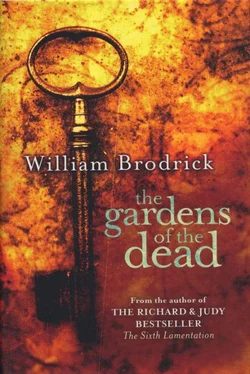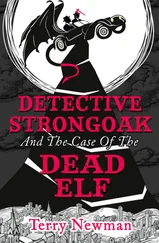William Brodrick - The Gardens of the Dead
Здесь есть возможность читать онлайн «William Brodrick - The Gardens of the Dead» весь текст электронной книги совершенно бесплатно (целиком полную версию без сокращений). В некоторых случаях можно слушать аудио, скачать через торрент в формате fb2 и присутствует краткое содержание. Жанр: Триллер, на английском языке. Описание произведения, (предисловие) а так же отзывы посетителей доступны на портале библиотеки ЛибКат.
- Название:The Gardens of the Dead
- Автор:
- Жанр:
- Год:неизвестен
- ISBN:нет данных
- Рейтинг книги:4 / 5. Голосов: 1
-
Избранное:Добавить в избранное
- Отзывы:
-
Ваша оценка:
- 80
- 1
- 2
- 3
- 4
- 5
The Gardens of the Dead: краткое содержание, описание и аннотация
Предлагаем к чтению аннотацию, описание, краткое содержание или предисловие (зависит от того, что написал сам автор книги «The Gardens of the Dead»). Если вы не нашли необходимую информацию о книге — напишите в комментариях, мы постараемся отыскать её.
The Gardens of the Dead — читать онлайн бесплатно полную книгу (весь текст) целиком
Ниже представлен текст книги, разбитый по страницам. Система сохранения места последней прочитанной страницы, позволяет с удобством читать онлайн бесплатно книгу «The Gardens of the Dead», без необходимости каждый раз заново искать на чём Вы остановились. Поставьте закладку, и сможете в любой момент перейти на страницу, на которой закончили чтение.
Интервал:
Закладка:
The Gardens of the Dead
William Brodrick
Sleep is well for dreamless head,
At no breath astonished,
From the Gardens of the Dead.
Walter de la Mare, ‘Dust to Dust’PREAMBLE
Elizabeth Glendinning QC walked purposefully beside Regent’s Canal in Mile End Park towards a trestle-table covered with junk from the houses of the dead. Behind it, his jaw working as if he’d tasted ash, sat Graham Riley, lolling in a camp-chair. To her right, sausages and onions sizzled on a hotplate; steam rose from an urn; clothing hung jammed on racks; bits of houses were laid on a blanket by a sign that read Architectural Reclamation’; tools from yesteryear, rusted, robust and manly, stood propped against a dinted van. Elizabeth passed them all, not quite looking, keeping her eye rather on the calm of the waterway to her left, and away from Graham Riley.
Despite years of handling tension, Elizabeth found the strain this morning unbearable: she had devised two grand schemes to bring this man from the camp-chair to the courtroom, that he might answer to his many victims. The first of these, after months of preparation, was about to be fulfilled.
Riley looked up, across the autumn fair, in utter disbelief.
Elizabeth was dressed in courtly black. She wore no make-up. Her hair had been precisely cut at quite fantastic expense. Through anxiety, her skin was pale and her lips peculiarly bloodless.
Riley’s jaw was still. He looked like a wasted, frightened boy surrounded by broken toys. But Elizabeth had travelled a long way beyond pity; she’d climbed to the mysterious and airless place where justice and mercy met. Holding her breath, at this the culmination of so much effort and sacrifice, she picked up a set of Edwardian spoons.
Feeling a sudden giddiness and a race of contractions in the heart, Elizabeth stumbled back the way she’d come, beside the smooth, green canal. She slumped in the driver’s seat of her lemon-yellow VW Beetle, stunned at her carelessness: she’d mastered the facts, but had failed to consult the law On the passenger seat was the orange flyer that had led her to Riley’s stall. She crumpled it with one shaking hand and forced the ball into an ashtray. She began to sweat and her breath fell short. Feeling a strange sense of moment – as when a train, out of view, hums on the lines – she unhooked her mobile phone off the dashboard and called Inspector Cartwright, being careful to leave only a message. She then rang Mrs Dixon. A rush of wind seemed to come, and Elizabeth dropped the phone mid-sentence. In the sluggish seconds left to her, Elizabeth found a last, winning smile.
Yes, she was inconsolable. She would never behold Charles, her husband, again… he was at Smithfield Market, fretting over the morrow; or Nicholas, her unwary son.., he was probably on the Barrier Reef, among the brightly coloured fish; or George, her friend and accomplice, who was waiting beneath a fire escape. And, yes, in terms of these grand designs of hers, death had come too soon. It was, as ever, the spoiler. But Elizabeth could laugh, and did. She’d devised contingency arrangements for precisely these circumstances. And there was one scheme left untried – the most far-reaching, and the most grave.
Her heart became wonderfully still.
All at once Elizabeth felt cold. It seemed that she was high above the clouds, coming down to earth at last. As she tumbled in the sunlight, she thought: Now is the hour of the unsuspecting friend, of the puzzled monk to whom I gave the key.
PART ONE
1
Anselm returned to Larkwood, weaving through the apple trees in Saint Leonard’s Field. The scooter skipped over tufts of grass, and Anselm bent his head, thinking of Steve McQueen at the end of The Great Escape. He could see the fence ahead. In a vivid reverie he saw himself soaring over the barbed wire, away from fiends who would cart him off to the cooler.
Whistling to himself, Anselm pushed the bike into the old woodshed, where he met Brother Louis, the choirmaster.
‘Hullo,’ said Anselm. ‘How was it?’
Appalling.’ He’d been on a ten-day residential counselling course. ‘I had to talk about myself Eye-to-eye stuff.’
‘Oh hell.’
Louis sat on a stump. He was tall and seemed to fold himself up. His eyebrows were copper and straight, as if they’d been electrified. Anselm rolled two cigarettes, obedient to a wink.
‘From the global perspective,’ said Louis, pensively ‘I found some relief’
‘Really?’
‘Yes. My parents aren’t to blame after all.’ He slowly pushed out the blue smoke. ‘I am.’
‘Don’t be deceived.’
Louis tilted his head towards the scooter. ‘Where’ve you been?’
‘Buying wood to bank the Lark.’
‘I hope you’ve got a receipt.’
Anselm had thrown it in the bin. ‘Why?’
‘Cyril’s gone round the bend. It’s that time of the year, I’m afraid. He’s doing the books and he can’t account for twenty-eight pence.’
As the cellarer, Cyril was responsible for the financial affairs of the monastery; he was the commercial brain behind various industries derived from apples and plums. An amputee after an industrial accident sustained before joining Larkwood, he had the appearance and character of a one-arm bandit chock-full of fruit and numbers.
‘Speaking of madness,’ resumed Louis, rummaging in a habit pocket, ‘the elderly Sylvester put this in my pigeonhole.’
Anselm unfolded the slip of paper: ‘Elizabeth called. Roddy is dead.’
Roderick Kemble QC, Anselm’s old head of chambers, a friend and guide from those half-forgotten days. ‘Oh, God.’
He ran to reception, where Sylvester struggled with buttons to get an outside line. Anselm hovered, itching to grab both the receiver and Sylvester’s larynx – it was a common problem at Larkwood – but shortly he made the call and a growing suspicion was confirmed. ‘I am still here,’ said Roddy ‘but Elizabeth is not.’
Anselm stepped into the sunlight. He looked towards Saint Leonard’s Field as if he’d been warned; and he thought of the key.
Anselm made for a quiet place beside the river – the place he’d brought Elizabeth when she’d turned up, all of a sudden, three weeks ago. A narrow flowerbed ran along a wall to an arch. Passing through, he turned right and sat on a bench of dressed stone – remnants of the medieval abbey, turned up by one of the tractors. The Lark splashed in front between the shoring of black timbers. Elizabeth had sat beside him. ‘I need your help,’ she’d said, quietly.
Thinking of that conversation now, Anselm recalled an earlier impromptu meeting ten years earlier – their last, in fact, before he’d left the Bar. Within a month he’d be at Larkwood. He’d been at home in Finsbury Park listening to Bix Beiderbecke knock out ‘Ostrich Walk’ when the doorbell rang (Anselm was a fiend for all jazz prior to an indefinable but tragic moment some time in the 1950s). It was Elizabeth, clutching a box of Milk Tray.
‘I don’t expect you’ll taste such delights in a monastery,’ she said. They sat in Anselm’s small garden eating chocolates, and reminiscing, while Bix moved on to ‘Goose Pimples’. They talked of the job and its strange compromise.
‘We always stand on an island,’ she said, ‘the cold place of not knowing, and not being able to care.’ Her hair fell forward: it was straight and black and cleanly cut, like a queen’s in the days of pharaoh. A silver streak marbled one side. It had appeared quite recently almost overnight. ‘We never know if they’re guilty, and we can’t care if they’re innocent. The terms are, of course, interchangeable. And yet, we do care; more than most. But we’re marooned from our conscience.’ She looked at her hands, checking the palms. ‘I’m sure there’s a trial out there for each of us, which could slip between the not knowing and the not caring and pull us off that beach.’
Читать дальшеИнтервал:
Закладка:
Похожие книги на «The Gardens of the Dead»
Представляем Вашему вниманию похожие книги на «The Gardens of the Dead» списком для выбора. Мы отобрали схожую по названию и смыслу литературу в надежде предоставить читателям больше вариантов отыскать новые, интересные, ещё непрочитанные произведения.
Обсуждение, отзывы о книге «The Gardens of the Dead» и просто собственные мнения читателей. Оставьте ваши комментарии, напишите, что Вы думаете о произведении, его смысле или главных героях. Укажите что конкретно понравилось, а что нет, и почему Вы так считаете.












